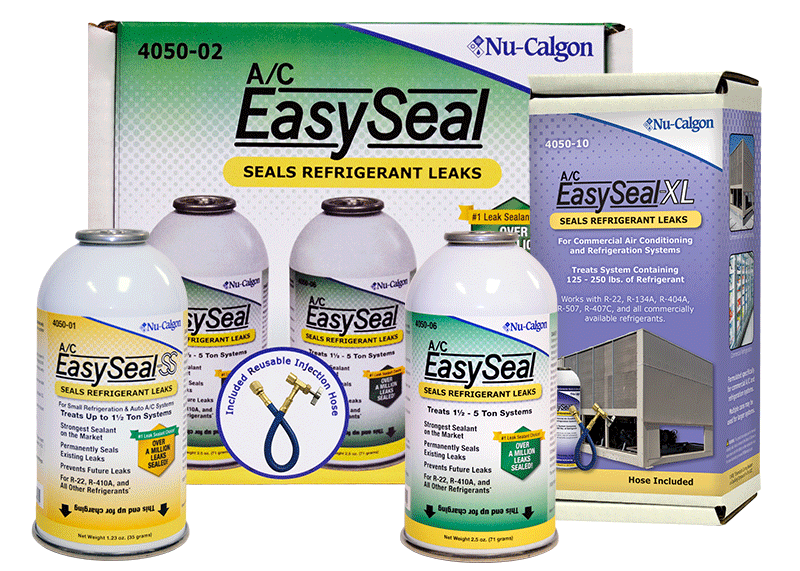A/C EasySeal
Description:
A/C EasySeal is designed to prevent as well as repair leaks anywhere in the system, including condensers, evaporators, copper lines, and soldered joints. It is easily injected into the system, traveling with the refrigerant, searching for leaks. The fact that A/C EasySeal travels with the refrigerant is very important to its ability to find leaks faster, using less sealant than those sealants designed to mix and travel with the systems oil.
The A/C EasySeal circulates through the system with the refrigerant seeking out leaks rather than migrating slowly with the oil…keeping in mind that only a small portion of the system oil actually migrates with the refrigerant through the system.
A/C EasySeal will react with moisture or air that is naturally present at a leak, forming a secure seal. A/C EasySeal is compatible with the refrigerant, oil and all system materials and it will not react until it comes into contact with the air and moisture at the leak, forming a permanent seal.
A/C EasySeal is a time saver. It finds leaks quickly and seals them, saving the time and money required in searching for the smallest leaks. With A/C EasySeal, the contractor is able to just add a can to the system and be confident the leak has been fixed and move on to the next job.
In most cases, one can will seal systems that have lost all refrigerant in as little as seven days and is designed for large systems up to 5 tons. For systems 1.5 tons to fractional, use A/C EasySeal-SS.
| Packaging Size | Part Number | Additional Info |
|---|---|---|
| A/C EasySeal XL | 4050-10 | DISCONTINUED ITEM |
| A/C EasySeal 2+1 | 4050-02 | 2+1 Display Pack |
| A/C EasySeal SS | 4050-01 | Treats fractional to 1.5 tons |
| A/C EasySeal | 4050-06 | Treats 1.5 - 5 tons |
Directions:
This product must be used in accordance to the following directions by HVACR professionals only.
Before using this product, it is recommended to use A/C EasyDry if moisture is present in the system.
If system’s low side pressure is below 65 psi while running (R-22):
- Shake can well. Make sure system is running and low side is below 65 psi.
- Be sure piercing valve handle is turned fully counter clockwise and then attach piercing valve to can.
- Attach other end of charging hose to low side service port. As this is done, there will be a very small release of system charge that will purge air from the hose.
- Turn piercing valve handle fully clockwise to pierce can. Invert can and hold above low side service port.
- While inverted, turn piercing valve handle counter clockwise to install A/C EasySeal. Allow approx. 1 minute for product to completely enter the system.
- Once product is dispensed, remove hose from low side service port. Retain hose for future installations and dispose can properly.
- Charge with refrigerant to achieve correct system pressure. DO NOT overcharge.
- Run system continuously for a minimum of 1 hour to allow product to fully circulate through system.
If system’s low side pressure is ABOVE 65 psi while running (R-410A):
First pump the system down to achieve a low side pressure between 40 and 50 psi. Then, inject into the low side starting with step 2 above. Detailed instructions in Application Bulletin 3-52. The bulletin can be downloaded under the "Product Information" tab.
REUSABLE CHARGING HOSE AND TAP VALVE, DO NOT DISCARD.
Note: For professional use only. Wear safety glasses and protective gloves. Use in accordance with all regulations and proper service practices in handling of refrigerant.
Product Information:
Literature Downloads
Download the product bulletin and other relevant literature here.
- A/C EASYSEAL 2+1 DISPLAY Product Bulletin
- A/C EASYSEAL-SS 6 X 1 CASE Product Bulletin
- A/C EASYSEAL 6X1 CASE Product Bulletin
Labels
Download a low resolution file of the product label here.
Product Safety
- 4050-01_02_06_10_SDS_ENG_20220110
- 4050-01_02_06_10_SDS_ENG_20220110
- 4050-01_02_06_10_SDS_ENG_20220110



